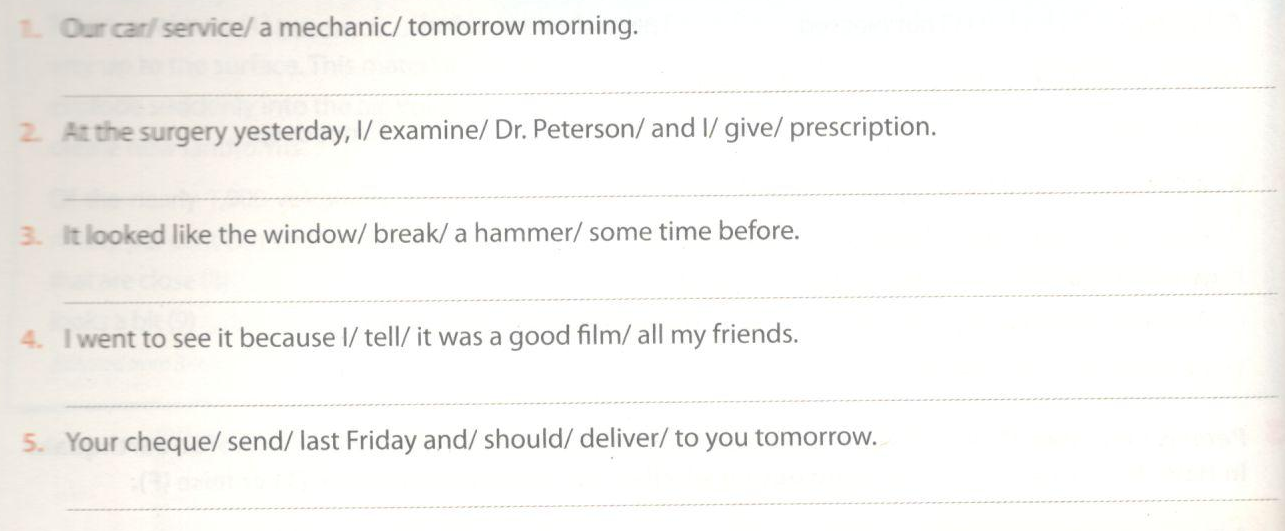WRITING
1 Write sentences in the passive, using the suggested words.
[ Viết các câu ở dạng bị động, sử dụng những từ được gợi ý]

Đáp án:
1.Our car is going to be serviced by a mechanic tomorrow morning.
[ Ô tô của chúng tôi sẽ được tân trang bởi thợ máy vào sáng mai.]
2. At the surgery yesterday, I was examined by Dr. Peterson, and I was given a prescription.
[ Trong cuộc phẫu thuật hôm qua, tôi đã được kiểm tra bơi bác sĩ Peterson và tôi được cấp đơn thuốc]
3. It looked like the window had been broken with a hammer some time before.
[ Có vẻ như là cửa sổ này đã bị phá vỡ bằng một cây búa trước đó rồi]
4. I went to see it because I had been told it was a good film by all my friends.
[ Tôi đi xem nó bởi vì tôi được kể rằng đó là một phim hay từ tất cả những người bạn của tôi.]
5. Your cheque was sent last Friday and should be delivered to you tomorrow.
[ Giấy ghi nợ của bạn đã được gởi thứ 6 tuần trước và nên được chuyển đến bạn vào ngày mai.]
2 a Think of a natural disaster and make a list of ways to prepare for it in the table below.
[ Nghĩ về một thiên tai và liệt kê các cách chuẩn bị đối phó với nó trong bảng bên dưới]

Đáp án:
TYPE OF NATURAL DISATER( loại thiên tai) :Flood ( lũ lụt)
WAYS TO PREPARE ( các cách chuẩn bị)
• - Check for local flood warnings if your area is at risk: look online or call Floodline.
• - Tune in to the local radio or television news for updates. Alert your neighbours, particularly elderly or vulnerable people.
• - Prepare an emergency kit, including emergency numbers, insurance policy, first aid kit, torch and water.
• - Use our home emergency contacts sheet so you have the numbers you need to hand, even if you lose power.
• - Have a list of irreplaceable items to keep safe and put important personal documents into a sealed bag.
• - Pack essential items you will need if evacuated – medication, clothing, toiletries and items for children.
• - Purchase unfilled sandbags and sand from builders’ merchants. Remember that, if there is a flood, demand may exceed supply - as people will rush to buy them.
• - Empty freezers and refrigerators, leaving doors open.
• - If you can, move any vehicles to higher levels.
• - If you have time, take photographs before you leave. This may help later with insurance claims.
• - Turn off the mains power and water, and take mobile phones and chargers with you. Put sandbags in toilet bowls to prevent sewage back-flow.
• - Shut windows, lock doors - and don't forget to take your pets.
b Now write about how to prepar for a disaster ( about 80 – 100 words). Use the ideas in 2a to help you.
[ Bây giờ viết về cách để chuẩn bị cho một thiên tai ( khoản 80 – 100 từ). Sử dụng các ý tưởng ở 2a để giúp bạn]
Đáp án:
HOW TO PREPARE FOR FLOODS
Millions of people in the south of Vietnam live and work in areas at risk of flooding from rivers or the sea. Floods cause a lot of serious damage to people, houses and crops. Therefore, people living in flooding area should know how to prepare for floods to minimize their effects.
- Check for local flood warnings if your area is at risk: look online or call Floodline.
- Tune in to the local radio or television news for updates. Alert your neighbours, particularly elderly or vulnerable people.
- Prepare an emergency kit, including emergency numbers, insurance policy, first aid kit, torch and water.
- Use our home emergency contacts sheet so you have the numbers you need to hand, even if you lose power.
- Have a list of irreplaceable items to keep safe and put important personal documents into a sealed bag.
- Pack essential items you will need if evacuated – medication, clothing, toiletries and items for children.
- Purchase unfilled sandbags and sand from builders’ merchants. Remember that, if there is a flood, demand may exceed supply - as people will rush to buy them.
- Empty freezers and refrigerators, leaving doors open.
- If you can, move any vehicles to higher levels.
- If you have time, take photographs before you leave. This may help later with insurance claims.
- Turn off the mains power and water, and take mobile phones and chargers with you. Put sandbags in toilet bowls to prevent sewage back-flow.
- Shut windows, lock doors - and don't forget to take your pets.
Giaibaitap.me
Tổng hợp bài tập Test Yourself 3 có đáp án và lời giải chi tiết
